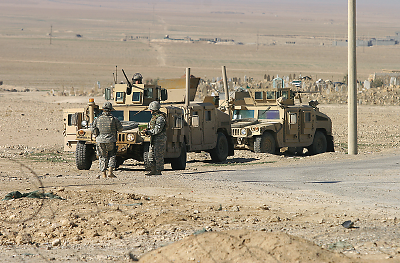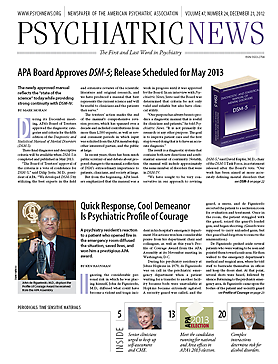Col. Philip Dingmann, M.D., a 24-year veteran of the Massachusetts Army National Guard experienced U.S. military operations in Iraq just as many of his patients did, he said at the American Academy of Psychiatry and the Law’s annual meeting in Montreal in October.
The Cape Cod psychiatrist went to Iraq in 2004, 2007, and 2011. Dingmann and the troops he served were often subjected to enemy fire. Rockets or mortars usually came in from 8 p.m. to midnight or from 2 to 4 in the morning. Sleep was often interrupted by warning alerts, and soldiers dashed to concrete shelters for protection until the attack passed. Soldiers—including the division psychiatrist—ended up with chronic insomnia and fatigue on top of all the other stressors they faced.
And those stressors weren’t confined to direct combat. Troops faced infectious diseases and other nonbattle injuries. Many didn’t sleep in the same place each night, depending on their duties. Most also had survived or witnessed roadside bomb blasts.
“Even without direct exposure to a blast, people can be shocked,” said Dingmann. “Surprise and a lack of control of the situation take their psychological toll, too.”
TBI Not on Radar a Few Years Ago
During his 2004 and 2007 deployments, there was little discussion of traumatic brain injury (TBI), he recalled. “But in 2011, TBI was everything.”
In that most recent deployment, Dingmann was responsible for 19 bases and 9,000 soldiers, scattered from Baghdad to Kuwait. Among his responsibilities was overseeing reports on TBIs, which was no simple process.
Medics and corpsman in the American forces use the MACE—the Military Acute Concussion Evaluation—to screen all soldiers exposed to a blast. Anyone who screens positive in the field must return to base for a follow-up examination, escorted by other members of his squad.
The commander decides if he can spare the individual and still carry out the unit’s mission, he explained. “So the affected soldier doesn’t want to be screened,” except in the worst cases.
Given the additive effects of concussive blasts, the lack of screening provides no record of exposure that might guide future treatment or requests for disability.
Mixed Messages Sent
Attitudes toward mental health care have evolved since 2004, though stigma remains said Dingmann.
Many of his psychiatric “evaluations” came outside the clinic. Soldiers talked informally in the gym, at church, or elsewhere, but there was a clear ambivalence about contacts with the unit psychiatrist.
“I’d sit down in the dining hall and talk with people,” he said. “But when they found out I was a psychiatrist, I could sit there the next day and clear the table.”
The chain of command understands the need for mental health services as part of the military mission, but ordinary soldiers are slow to accept the open discussion of emotions, he said. For them, anyone even seen talking to a psychiatrist is perceived as weak.
“They’ll decide there’s something wrong with that soldier and will lose trust in him,” he said. “There are a ton of people who are injured psychologically and physically who are never evaluated and never will be.”
The Army trains soldiers to be each other’s confidant, and urges that serious cases be escorted to the chain of command for formal assessment.
Even after troops return home, soldiers resist talking about their psychological concerns.
“Troops repeatedly deployed over the years have an increasingly difficult time reintegrating into civilian life,” he said. “They struggle with hypervigilance and anger while facing the indifference of civilians and a lack of military discipline and structure.”
Even Dingmann wasn’t immune from the feelings that keep his fellow soldiers from seeking care.
“It’s hard for someone in our field to sit on the other side of the desk,” he said.
Back home in Massachusetts, he decided he needed help for himself. He drove to the VA Boston Healthcare System’s Brockton facility but sat in the parking lot long past his appointment time. Eventually, the therapist with whom he had the appointment called him on his cell phone, came outside, and walked him into the building. ■

